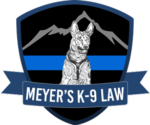Reliability Foundation
After a traffic stop, PSD team was called out for a free air sniff. LE found out that driver was not licensed so driver called for a someone to get the car. Driver waited in cruiser; during this time, PSD team arrived and conducted a sniff. The defense attacked the sniff on various levels. First, they claimed PSD had some medical issues which could impact his ability to do his job. Second, they claimed that Utah POST training requirements were not adequate, specifically that Utah POST did not require even single blind testing. In addition, Utah does not train against cueing. Third, even though Utah POST defined an alert and a final indication differently, the defense alleged that PSD’s behavior at the sniff was not even an alert, according to the defense expert. Fourth, PSD was lacking in on-going training and the training that was conducted was mostly exercises in which the handler knew the location of the find. Fifth, the defense expert opined that the handler was, at least inadvertently, cueing the PSD. Sixth, the handler did not keep adequate records of PSD’s field performance, testifying that he filled in reports from “muscle memory” and skipped boxes or failed to provide information.
There was no expert offered on behalf of the government. The motion to suppress was granted and the court held that Utah POST requirements for certification are inadequate. While this case is only precedent in the federal district in Utah, it would serve all agencies to review the certification process they have in place and make sure that training and record keeping are up to date and accurate.
